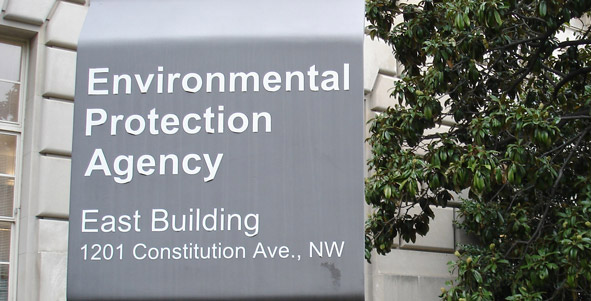
Agricultural News
EPA Releases Bold National Strategy to Transform Recycling in America
Mon, 15 Nov 2021 11:36:30 CST
 Today, the U.S. Environmental Protection Agency (EPA) released the 2021 National Recycling Strategy to tackle major recycling challenges facing the nation and to create a stronger, more resilient, and cost-effective municipal solid waste recycling system. The 2021 strategy is also the first time EPA's recycling strategy will address the climate impacts of producing, using, and disposing of materials and focus on the human health and environmental impacts of waste and waste-related facilities in overburdened communities, reflecting the Agency's commitment to delivering environmental justice.
Today, the U.S. Environmental Protection Agency (EPA) released the 2021 National Recycling Strategy to tackle major recycling challenges facing the nation and to create a stronger, more resilient, and cost-effective municipal solid waste recycling system. The 2021 strategy is also the first time EPA's recycling strategy will address the climate impacts of producing, using, and disposing of materials and focus on the human health and environmental impacts of waste and waste-related facilities in overburdened communities, reflecting the Agency's commitment to delivering environmental justice.
"Our nation's recycling system is in need of critical improvements to better serve the American people. EPA's National Recycling Strategy provides a roadmap to address system challenges and pave the way for the future of recycling," said EPA Administrator Michael S. Regan. "As we move forward with this strategy, EPA is committed to ensuring that historically underserved and overburdened communities share in the benefits that our work will deliver. Together with the historic investments in recycling from the Bipartisan Infrastructure Deal, the strategy will help transform recycling and solid waste management across the country while creating jobs and strengthening our economy."
"The full impact of waste materials is connected to a broad range of issues, and having a strategy that promotes better materials management can help lead us to solutions for these larger issues," said Dr. Sacoby Wilson, EPA National Environmental Justice Advisory Council Member and University of Maryland Associate Professor/Director, Community Engagement, Environmental Justice and Health Initiative, Maryland Institute for Applied Environmental Health and Department of Epidemiology and Biostatistics. "We have to work with industries that are significant sources of single use products. And, when we address recycling, we must address where these waste products come from, where they go, and how they're impacting the health, sustainability, and quality of life in communities of color."
The U.S. recycling system faces many challenges, including reduced markets for recycled materials, recycling infrastructure that has not kept pace with today's diverse and changing waste stream, confusion about what materials can be recycled, and varying methodologies to measure recycling system performance. The 2021 National Recycling Strategy identifies actions to address these challenges that build on the collaborative efforts by stakeholders from across the recycling system that began under the 2019 National Framework for Advancing the U.S. Recycling System.
The National Recycling Strategy includes five strategic objectives with specific actions to strengthen the U.S. recycling system:
1. Improve markets for recycled commodities through market development, analysis, manufacturing, and research.
2. Increase collection of recyclable materials and improve recycling infrastructure through analysis, funding, product design, and processing efficiencies.
3. Reduce contamination in the recycled materials stream through outreach and education to the public on the value of proper recycling.
4. Enhance policies and programs to support recyclability and recycling through strengthened federal and international coordination, analysis, research on product pricing, and sharing of best practices.
5. Standardize measurement and increase data collection through coordinated recycling definitions, measures, targets, and performance indicators.
In addition, the Strategy focuses on how the Agency will move forward in the following areas:
· Increasing Equitable Access for Overburdened Communities: EPA recognizes the burden that living near waste and waste-related facilities has on communities when waste is not properly managed, which can lead to higher levels of chronic health issues. The 2021 Strategy will increase equitable access to recycling services, reduce environmental impacts in communities, stimulate economic development, and ensure overburdened communities meaningfully participate during the strategy's implementation.
· Reducing Climate Impacts of Materials Management: The 2021 Strategy includes a commitment by EPA to create a new national goal to reduce the climate impacts from the production, consumption, use, and disposal of materials, which make up approximately 50 percent of global greenhouse gas emissions, according to the United Nations Environment Programme' s International Resource Panel. This new climate goal will help achieve President Biden's commitment to achieve a 50-52-percent reduction from 2005 levels in economy-wide net greenhouse gas emissions by 2030.
· Managing Materials for a Circular Economy: While this initial 2021 Strategy focuses on the recycling of municipal solid waste, additional work is necessary to create a "circular economy" where materials (e.g., plastics, food waste, electronics, and industrial materials) are sustainably managed throughout their lifecycle. EPA, in coordination with other federal agencies and interested stakeholders, intends to release subsequent strategies that will encompass other activities beyond the recycling of MSW, reflecting the need for sustainable product design, reducing waste generation, and materials reuse activities critical to realizing circularity. Subsequent strategies will address other key materials, such as plastics, food, cement and concrete, as well as electronics.
During the next few months, EPA will work collaboratively with stakeholders to develop a plan to implement the 2021 Strategy. EPA will collaborate with communities, local, state, federal and Tribal partners, and with public and private stakeholders to achieve the strategy's ambitious goals.
WebReadyTM Powered by WireReady® NSI
Top Agricultural News
More Headlines...




